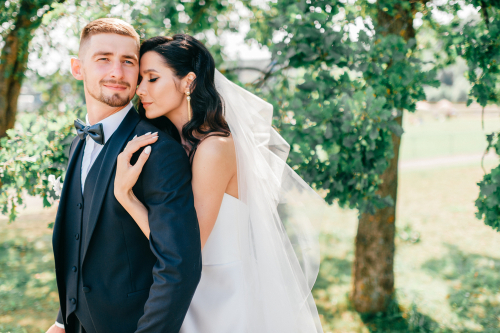
One of the best parts about second weddings is that you have a do-over — in more ways than one.
From daisies instead of roses or a fun Gatsby-themed reception instead of a formal sit-down dinner, you can include all the things you wished your first wedding would’ve featured and incorporate so much about who you are today.
However, there are some important aspects that most brides looking at their second weddings will want to consider.
Big or Small
One of the biggest questions people ask about second weddings is whether it’s in good taste to have a blowout event. While there’s no wrong answer here, there are some differing opinions. Some people believe having a second big wedding is a major red flag if your first was extravagant or took place less than five years ago.
Additionally, if either of you has kids, you might also want to consider their thoughts and feelings about the size of the wedding. In some cases, big weddings are harder on kids. However, keep in mind the size of your wedding is personal. Although second weddings are normally smaller, the right choice is ultimately what feels right to you.
Ceremony Alternatives
Conversely, if you’re unsure about the size of wedding you would like to have, consider some alternative options, like a destination wedding that combines your nuptials with your honeymoon in one memorable package. This approach also helps you avoid anyone comparing your first and second weddings.
Of course, you can also change the format. For instance, you could skip the traditional walk down the aisle and start your second wedding with a receiving line. After you and your future spouse greet all the guests, you can walk down the aisle together toward your new life as a married couple.
Religious or Secular
You might also wonder about whether a religious ceremony is appropriate, regardless of size. You should know that some faiths do not recognize second marriages and some houses of worship will refuse to perform the ceremony. However, many others do not. If you are religious, you should talk to your priest, rabbi or other clergymen about your options.
The Dress
There is always the question about wearing white, too. This is also highly personal. While choosing a non-white wedding gown or at least a less-fancy white dress is common, wear white if you want.
Including Children
If you have children, or your future spouse has kids, you might want to make them part of the ceremony. There are a few ways you can do this. Have them perform the role of flower girl/ring bearer or ask them to be a bridesmaid/groomsman. Another option is to include the children in the ceremony. This is normally done by including a family vow after your nuptials or by a unity ceremony that immediately follows the wedding.
Showers and Registries
Showers and registries are issues, too. Indeed, these conventions traditionally exist to help the new couple get set up for adult life. But if this is your second wedding, you and your spouse likely already have everything you need; in fact, you probably have doubles from combining your households.
For this reason, most people don’t bring gifts to a second wedding, so don’t expect them. If people close to you are asking you to throw a wedding shower or buy gifts, keep the party small and limited to only your closest friends and family.
The Perfect Invitation
Second weddings tend to be more intimate, and your wedding invitations should reflect that, too. Choose a simple design that reflects your personal aesthetic, as well as the wedding you have planned in your mind. Clean lines, a photograph of the happy couple and a more informal appearance are a good start.
You may have planned a wedding previously, but this is your first one together — and that makes it special. Take the time to navigate any second wedding pitfalls, so that you stay on the right side of etiquette and enjoy your wedding day.
























